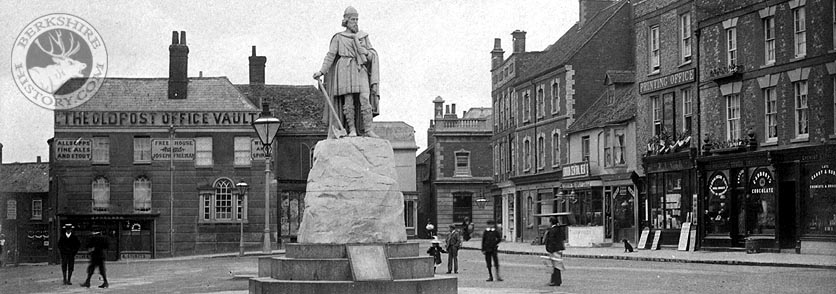 |
 |
|||
|
|

Black Wantage In spite of its prosperity, it must be confessed that the town of
Wantage was in a neglected and really discreditable state throughout the 18th and 19th centuries. It was the headquarters of pedlars and hawkers within, and of gipsy encampments without. Hence, it is not surprising to learn that badger-baiting and cock-fighting were among the favourite amusements. Bull-baiting was also tolerated in the parish, in the precincts of an inn known as ‘The Camel.’ This inn became the resort of such rough characters that its licence was taken away and bull-baiting suppressed. Perhaps one of the most thriving trades, and the one that outdid all others, was that of malting, from the fact that most private householders brewed their own beer. There were also numerous public-houses: one of them, called ‘Thatchells’ in Back Street, was the origin of what is now the Wantage Brewery Company. There must have been at least a dozen more public-houses then than at the turn of the 20th century. Four had been closed in the Market Place during the previous century, ‘The Falcon’ and ‘The Globe’ which occupied the site of the old Town Hall, ‘The Crown’ which was transformed into Wheeler Bros Tailors & Outfitters, ‘The Lion’ which faced the Corn Exchange and ‘The Brandy Butt’ in Church Street. The excessive supply of beer was the cause of much drunkenness, and scarcely a night passed without brawling and other disorderly scenes. Fires were of frequent occurrence, and serious crimes brought disgrace upon the town, which at one time was stigmatised as ‘Black Wantage’. A fearful murder, committed at the ‘White Hart Inn’ (later the Post Office) in 1833 was still recalled with horror after three generations. Religious influence was at the lowest ebb, for the Vicars usually visited the town about twice a year to collect tithes, leaving the parishioners to the mercy of anyone who could be found to take the services. It is said that, in these times, when the ‘Bow Street Runners’ let one of their criminals escape, Wantage was always one of the first places in which they searched for him. The ancient custom of ringing a bell at eight o'clock was long kept up in Wantage in order to help keep the people safe. By some it is supposed to be the Curfew; while others maintain that a sum of money was left by a person who was lost on the Downs, so that a bell might be rung every night from 29th September to 25th March, that its sound might direct other travellers in a like predicament to the town. There was also a sum of money, the rent of a piece of land in Hanney Parish called ‘The Bellman's Swathe,’ to pay for the ringing of a bell at five am from 20th September till 2nd February. The object of this is said to have been to call the agricultural lads up to attend to their horses. On Shrove Tuesday, a bell was also rung at eleven o'clock which was called by many the ‘Pan Bell’. It was, of course, the ‘Shriving Bell,’ to call the people to make their confessions before Lent. The town was only lit by means of oil lamps which gave only a very poor glimmer, and were of very little service. By whatever means or authority the town was governed prior to 1828, it would seem that it was not of a satisfactory nature, for we find that, in that year, an Act of Parliament was granted to the town, entitled "An Act for the better Lighting, Watching, Cleansing, Paving and otherwise improving the town of Wantage." The Act is of a rather voluminous character, containing no less than 104 clauses, many of them being of a very stringent kind, much more honoured in the breach than in the observance. Its opening sentence is very quaint, "Whereas the town of Wantage is a large and populous place," and it goes on to define the number of persons to be appointed and held responsible for the carrying out of its provisions. These were thirty in number, and the qualification to be a commissioner - as they were styled - was either to be possessed of freehold property of the annual value of £20, or to have £1,000 invested in securities. This Act, put into operation at once, swept away the very antiquated custom of having night watchmen, who paraded the streets all night long, and called out hour by hour the state of the weather, such as "past 12 o'clock and a cloudy night" or "past 3 o'clock and a fine morning." These men gave way to the appointment of two others, who were the silent guardians of the night, and it was the duty of these officials to attend, every morning about nine o'clock, at the house of the High Constable, to sign a book and make a statement in writing if anything unusual had come under their notice during the night. There was also a policeman for day duty. This order of things went on until 1856, when the Berkshire Constabulary were introduced, and the charge of the town was handed over to them to carry on, still under the provisions of the ‘Local Act.’ Edited from Gibbons & Davey's 'Wantage Past & Present' (1901).
|
|||
| © Nash Ford Publishing 2017. All Rights Reserved. The location of these events is now administered by Oxfordshire County Council. | ||||


